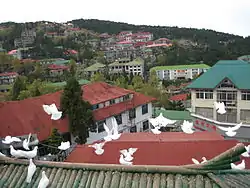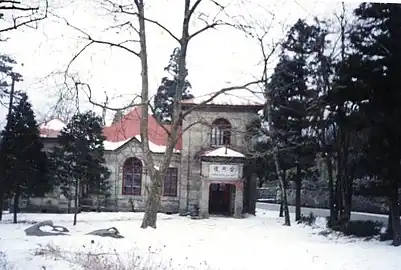Guling, Jiangxi
Guling, formerly romanized as Kuling, is a summer resort located on top of Mount Lu in Jiujiang, Jiangxi Province, China. It was formerly a resort reserved for European missionaries.[1] Now it is the tourist and administration center of the Lu Mountain National Park, a World Heritage Site.[2]
Guling
牯岭镇 | |
|---|---|
 | |
| Coordinates: 29°34′13″N 115°58′36″E | |
| Country | China |
| Location | Mount Lu, Jiujiang |
| Founded by | Edward Selby Little (李德立), Dr. Edgerton Haskell Hart, and three others |
| Time zone | UTC+8 (China Standard) |


As of 2018, it has 5 residential communities, 2 villages, and 4 other neighborhoods under its administration.[3]
History
European settlement history
Kuling, now called Guling, on the slopes of a wide valley of Lu Mountain, was established in 1895 by the missionaries Edward Selby Little, Dr. Edgerton Haskell Hart, and three others, as a sanitarium and rest resort for Western missionaries in southern China. They built their houses in the colonial style of architecture, and added churches, schools, and sports facilities. It was named by Little, as a pun: it is wonderfully cooling after the summer heat in the plains below. It was also a word that sounded conveniently Chinese to the local people, and has been adopted by them. Kuling was run by the missionaries in a Kuling Council that sold the plots of the land and with the proceeds, paid for local services and security. In 1910, Caroline Maddock Hart and four others met to found the Nurses Association of China, with Caroline Maddock Hart being its first president.
The Republic of China history
1934, Soong Mei-ling, then first Lady of the Republic of China, was given a villa in Kuling town, Lu Mountain. She and her husband Chiang Kai-shek both loved the villa very much. Chiang Kai-shek named the villa as Mei Lu Villa to symbolize the beauty of Lu Mountain. The couple usually stayed at this villa in Kuling town, Lu Mountain, in summer time, so the mountain is called Summer Capital, and the villa is called the Summer Palace.[4][5][6]
Prior to 1949, President Chiang Kai-shek chose Lu Mountain as the summer headquarters for his nationalist Kuomintang government, having been introduced to the place by his wife Soong Mei-ling, the daughter of a Shanghai Methodist minister. It was here that, in 1946, the U.S. special diplomatic mission representing the President of the United States, led by General George C. Marshall, met with Chiang Kai-shek to discuss the role of post-World War II China.
Modern history
After the conclusion of the Chinese Communist Revolution in 1949, it became the favourite meeting place for the Central Committee of the Chinese Communist Party because Chairman Mao used Chiang Kai-shek's house as one of his holiday homes. It hosted the Eighth Plenum of the Eighth Central Committee, also known as the Lu Mountain Conference or "Plenum", which began on 23 July and convened on 2 August 1959. Kuling also hosted the Second Plenum of the Ninth Central Committee in August 1970.
The movie Romance on Lu Mountain, which has been shown in the Lu Mountain theatre non-stop since 1980, was recognised by Guinness World Records as the longest-running movie in theatres. Each ticket sold to this movie is numbered according to ticket sales to date. As of May 2006, this number was close to 140 million tickets.
Notable residents
- Pearl S. Buck (1892–1973) was the first American woman to win the Nobel Prize in Literature, in 1938, for her rich and truly epic descriptions of peasant life in China. She also won the Pulitzer Prize in 1932. She spent her childhood with her family in Kuling in summertime. Her father built a stone villa in Kuling in 1897 and lived there until his death in 1931.[7][8]
- Mervyn Peake (1911–1968) was born in Kuling, Lu Mountain. He was an English writer, artist, poet, and illustrator. He was well-known for being the illustrator of Alice's Adventures in Wonderland[9] and the author of the Gormenghast series of novels.
- Lo-Yi Chang (1907–1988) was born in Kuling. She was the spouse of T. V. Soong, then Premier of the Republic of China. She has made significant contributions of promoting interculture understandings between China and western countries.[10]
Climate
| Climate data for Guling (elevation 1,165 m (3,822 ft), (1991–2020 normals, extremes 1981–2010) | |||||||||||||
|---|---|---|---|---|---|---|---|---|---|---|---|---|---|
| Month | Jan | Feb | Mar | Apr | May | Jun | Jul | Aug | Sep | Oct | Nov | Dec | Year |
| Record high °C (°F) | 19.4 (66.9) |
20.5 (68.9) |
24.6 (76.3) |
26.4 (79.5) |
28.1 (82.6) |
29.3 (84.7) |
31.8 (89.2) |
31.8 (89.2) |
30.2 (86.4) |
28.5 (83.3) |
25.1 (77.2) |
18.9 (66.0) |
31.8 (89.2) |
| Average high °C (°F) | 4.5 (40.1) |
7.0 (44.6) |
11.0 (51.8) |
16.8 (62.2) |
20.7 (69.3) |
23.2 (73.8) |
26.1 (79.0) |
25.3 (77.5) |
21.9 (71.4) |
17.3 (63.1) |
12.7 (54.9) |
7.0 (44.6) |
16.1 (61.0) |
| Daily mean °C (°F) | 0.6 (33.1) |
2.9 (37.2) |
6.7 (44.1) |
12.5 (54.5) |
16.8 (62.2) |
19.8 (67.6) |
22.5 (72.5) |
21.8 (71.2) |
18.1 (64.6) |
13.3 (55.9) |
8.5 (47.3) |
2.9 (37.2) |
12.2 (54.0) |
| Average low °C (°F) | −2.3 (27.9) |
−0.1 (31.8) |
3.5 (38.3) |
9.1 (48.4) |
13.7 (56.7) |
17.3 (63.1) |
20.3 (68.5) |
19.5 (67.1) |
15.7 (60.3) |
10.5 (50.9) |
5.5 (41.9) |
−0.2 (31.6) |
9.4 (48.9) |
| Record low °C (°F) | −13.6 (7.5) |
−11.6 (11.1) |
−10.4 (13.3) |
−5.1 (22.8) |
1.6 (34.9) |
5.8 (42.4) |
11.9 (53.4) |
12.8 (55.0) |
6.5 (43.7) |
−2.4 (27.7) |
−9.9 (14.2) |
−16.7 (1.9) |
−16.7 (1.9) |
| Average precipitation mm (inches) | 85.3 (3.36) |
98.5 (3.88) |
167.9 (6.61) |
202.2 (7.96) |
251.2 (9.89) |
306.1 (12.05) |
274.2 (10.80) |
290.3 (11.43) |
147.8 (5.82) |
97.4 (3.83) |
83.0 (3.27) |
61.7 (2.43) |
2,065.6 (81.33) |
| Average precipitation days (≥ 0.1 mm) | 14.3 | 13.7 | 17.0 | 16.7 | 16.2 | 17.4 | 13.5 | 15.3 | 10.8 | 10.4 | 11.7 | 11.2 | 168.2 |
| Average snowy days | 9.3 | 6.7 | 3.5 | 0.1 | 0 | 0 | 0 | 0 | 0 | 0 | 1.3 | 5.2 | 26.1 |
| Average relative humidity (%) | 73 | 76 | 77 | 77 | 79 | 85 | 85 | 87 | 84 | 75 | 69 | 65 | 78 |
| Mean monthly sunshine hours | 112.3 | 102.4 | 112.9 | 130.4 | 136.5 | 111.4 | 175.7 | 153.9 | 147.6 | 158.8 | 144.0 | 142.7 | 1,628.6 |
| Percent possible sunshine | 35 | 32 | 30 | 34 | 32 | 27 | 41 | 38 | 40 | 45 | 45 | 45 | 37 |
| Source: China Meteorological Administration[11][12] | |||||||||||||
References
- 2018年统计用区划代码和城乡划分代码:庐山市 (in Chinese). National Bureau of Statistics of the People's Republic of China. Archived from the original on 2019-03-24. Retrieved 2019-03-08.
- "Guling". Tuniu. Archived from the original on 27 April 2017. Retrieved 10 July 2017.
- 2018年统计用区划代码和城乡划分代码:牯岭镇 (in Chinese). National Bureau of Statistics of the People's Republic of China. Archived from the original on 2019-03-24. Retrieved 2019-03-08.
- WANG, N. N., & JIANG, Z. (2007). "Using natural with ingenious ways, man and naturelive in harmony"——Simplyanalysis thedesign concepts of Mount Lushan" Meilu" villa to the inspirationofmodern ecological landscape design. Hundred Schools in Arts, 03.
- "Kuling American School Association - Americans Who Still Call Lushan Home". Kuling American School Association 美国学堂 Website. Archived from the original on 20 July 2021. Retrieved 24 July 2021.
- "《今日庐山之"美庐"》". 故宫博物院The Palace Museum Website. Archived from the original on 24 July 2021. Retrieved 24 July 2021.
- "赛兆祥墓碑". mylushan.com. Archived from the original on 22 June 2010. Retrieved 22 July 2021.
- "Pearl S. Buck house in Zhenjiang". Archived from the original on 6 August 2020. Retrieved 22 July 2021.
- Carroll, Lewis (12 October 2001). Alice's Adventures in Wonderland. ISBN 1582341745.
- 池昕鸿 (22 July 2015). "国内名人传记丛书(套装共6册)". books.google. Archived from the original on 21 May 2022. Retrieved 22 July 2021.
- 中国气象数据网 – WeatherBk Data (in Simplified Chinese). China Meteorological Administration. Retrieved 23 September 2023.
- 中国气象数据网 (in Simplified Chinese). China Meteorological Administration. Retrieved 23 September 2023.